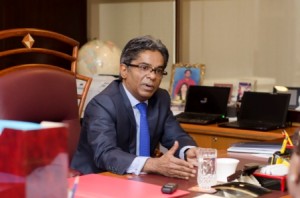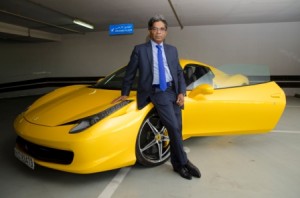Chartered accountant Rajiv Saxena has a penchant for numbers, just like his love for fast cars
YOU CAN’T talk about accountancy in the UAE without mentioning Rajiv Saxena. As one of the industry’s leading figure both locally and abroad, the shrewd businessman has an astute acumen and a formidable IQ which he both engages to steer him through a life of remarkable achievements. He talks to Joyce Njeri about his passion for numbers, Ferraris, the importance of family, charity and leaving a legacy …
A ride in his 458 Spider customised Ferrari comes to a stop outside one of Dubai’s upmarket addresses, where a large barrier glides upwards and ushers us in into the imposing Emirates Crown apartment building in the Marina area. As we drive a few metres inside the basement parking area, a couple of other top-of-the range cars parked next to each other are evidence of what it means to live a life of luxury and comfort.
No, Rajiv Saxena is not a Bollywood hunk, but a chartered accountant who, as he puts it, “has rightfully earned his wealth through sheer hardwork, discipline and dedication.”
And just like his stylish apartment, his new UHY-Saxena offices at Mazaya Business Avenue ooze class and contemporary sophistication. Located in a high rise building just behind Jumeirah Lake Towers (JLT), the entire office interiors look as if they’ve been designed for the connoisseur. These suite-like rooms also have a separate dining and meditation area.
Contemporary sophistication
The executive offices are encased by a deep rich mahogany finish, blending with modern art design elements. The walls and work surfaces feature veneers which have glassy-metallic finish, not mentioning the cozy brown leather couches which have been colour-coordinated to bring out an inviting environment with executive style, characteristics and function.
This is where I settle down for a long chat with Rajiv, the Managing Partner at accounting firm UHY – Saxena.
Rajiv is not your regular smart-suited-black-tie accountant. The down-to-earth father of two has a penchant for numbers and figures, just like his love for Ferraris.
He took me for a spin around the Marina area in his bright yellow-coloured powerful machine.
“Why yellow?” You may ask.
“Ferraris have long been associated with the red colour but what many people don’t know is that the brand’s original colour was actually yellow, and not red,” he quips.
Spider specs
The 458 Spider Ferrari is the latest addition in his impressive collection. The cabin features a seamless combination of comfort and elegance, and unlike the other brands of cars, the Spider doesn’t have the clustering of controls on the steering wheel.
“This ensures that the driver can easily reach all of the commands without loosening his grip on the steering wheel,” Rajiv brings me up to speed, literary, with the inside-functionalities of his pretty little thing.
“The 458 Spider is more oriented towards weekend driving trips with a friend or your partner, rather than using it for your daily means of transport to work,” he adds.
And his love for Ferraris does not end there. He is also a member and honorary treasurer of the Ferrari Club of Dubai and enjoys a pretty hectic social life with his family and friends.
In the thick of the 2008-2010 global recession, most certified accountants were scratching their heads and chained to their desks while trying to balance their books and grind out returns. This is a period Rajiv would want to forget fast.
Swirling comfortably in his chair, Rajiv was forthcoming and direct about the global financial crisis.
“We are in 2012, and yet we are still hearing stories about banks’ write offs, undiscovered bad mortgages, the Libor scandal, so four years later have we learnt a lesson? He asks rhetorically.
“It’s not a secret that bad accounting practices and habits always have a way of reflecting in the overall performance of a company,” he says, without mincing words, adding, “The lesson learnt is that we as professionals need to go back to our conservative bases.”
“The accounting and banking industries have been adopting tougher regulatory measures to restore public confidence and prevent the recurrence of another global financial crisis,” he continues, “However we still witness mistakes and scandals in these lending institutions.”
“The banking industry in particular has been battered, from the myriad of never ending scandals. These banks will have to work hard to regain investors’ confidence,” he says.
Lessons from financial crisis

TALKING POINT: The lesson learnt (from the global financial meltdown) is that we as professionals need to go back to our conservative bases, Rajiv says.
Late last year, Swiss bank UBS revealed it had lost around $2 billion due to rogue dealing by one of its traders. In May, US bank JPMorgan Chase announced it lost $2 billion on a bad trade. The announcement led to its share price plunging by more than 11 per cent, shaving about $17.5 billion from its market value, according to Bloomberg figures. In June, Barclays bank was fined £290 million by US and UK regulators for attempting to manipulate inter-bank lending (Libor) rates.
“A vital question remains for investors – have banks and other financial institutions learnt their lessons post global economic crisis?” he asks rhetorically.
“After the anguish of the past four years, it is difficult to imagine what else could go wrong for the banking industry,” he laments, looking serious in a smart navy blue suit, azure-coloured shirt accessorised with a matching tie.
Since the crisis hit, there has been doubt concerning the use and implementation of the International Accounting Standards (IAS). A wave of changes has been urged on the part of the global standard-setters like the Financial Accounting Standards Board (FASB) and the International Accounting Standards Board (IASB) for the need for improvement and more transparency in the industry. Rajiv opines that accounting standards should be harmonised in order to bring lucidity and fairness in all countries.
“We have a great divide on accounting standards across the Atlantic.”
“The European accounting standards are quite different from the American accounting standards, so what is needed is to bridge that gap. These standards need to be unified,” he says firmly.
“Flawed financial reporting served as the root cause of global economic crisis through some accounting rules such as mark-to-market valuation commonly known as ‘fair value,’ and the delay in recognition of bad debts, until losses was incurred. This led to massive distortion of information and investment decisions, which eventually contributed to market failures.”
He urged for better balance of respective countries’ common law and statutory approaches to financial reporting in order to minimise and alleviate such mistakes.
“Our role as auditors is to provide accurate financial reporting for the markets so investors can independently value the securities and make decisions accordingly,” he said.
UHY-Saxena global operations
Not only is Rajiv Saxena a skillful professional but he is also the embodiment of what one can achieve through dedication and hard work.
His accounting firm UHY-Saxena is a member of Urbach Hacker Young International Limited – a UK company. In 1999 Rajiv was selected to become an independent member of an International firm of auditors and accountants UHY and joined them the same year.
UHY is a global network of accounting and consultancy firms with over 6,800 professionals operating in more than 250 business centre’s in 81 countries across all continents.
UHY in Dubai has now over 70 professionals working in the newly finished Jumeriah Lake Tower office combining much of the workforce from the other four offices situated in the UAE.
“I discovered the industry in the Middle East 21 years ago, that is when I came to set up my firm, at that time, audit was not even a requirement in businesses. We had very few enterprises which required an auditor because they were only a few firms that had financial exposures to banks, so we had very few firms that bothered with the audit. But over the years… it has changed.”
“We’ve had new regulations coming in. Actually there are regulations in place that require all the limited companies to have their accounts audited. But these regulations are not strictly implemented, and if there is any form of implementation, it varies between the emirates. For instance Dubai may not implement the same regulations as Abu Dhabi, while the emirate of Sharjah has a different set of regulations to that of Dubai, required for audit on limited liabilities companies.”
“So first of all we need a standard, and we need a strict implementation of these regulations because limited liability companies form the largest group of corporate in the UAE, and till today I haven’t seen any strict regulation that companies are required to file their audited financial statements in order to have their business licenses renewed. In the free zones you have stricter implementation so you have much higher percentage of companies on audit. So I think the basic need of the day is first of all the implementation of audit rules, they need to be made compulsory, whether by the Central Bank or by the Ministry of Economy is a different matter but for the purposes of financial health of companies, regulation compliance has to be enforced.”
“If businesses do not comply with audit regulations, there should be a penalty imposed by the government,” he says. UHY-Saxena embarked on a growth and development strategy in early 2000 and is now managed by a professional Board of Directors and has diversified its activities to include business intelligence and private client services.
Remarkable journey into accountancy

FAMILY MAN: Apples don’t fall far from the tree and just like their father, Rajiv’s children Tanisha (L) and Tanmay (R) are pursuing equally demanding careers, pictured here with their mother Shivani.
In 2001 Rajiv set up the Matrix Group Limited as an independent business unit. The company now has interests in hospitality, mining, power, metals and real estate with interests in India, U K Europe and Africa. Rajiv serves as an independent director in a number of companies.
Being a hands-on CEO, the high-flying chartered accountant always travels in style… by air, land and water to these offices where he personally supervises work and engages employees.
And what’s his leadership style? “Open door policy,” he answers. Rajiv was born into a middle class family, in 1958 in Bombay, India.
His father was an economist for the United Nations (UN) and travelled the world undertaking economic development work on their behalf. His mother, he says, “was the driving force in the family unit and supported my father in his Indian business ventures.”
The accountant was schooled in Bombay at the Jesuit Campion School in Colaba before entering the Sydenham College of Commerce and Economics part of Bombay University to begin a Bachelor of Commerce degree course at the age of 18 years.
After graduating with honors he went on to a three-year post professional graduate course in chartered accountancy with the Institute of Chartered Accounts of India (ICAI). On completion of his post professional graduate course he was enrolled as a member of the Institute where he now holds a fellowship of the ICAI.
“This is where the impetus for private accountancy practice began to take shape in my mind,” he says.
“I needed to be able to be creative and control my own destiny, and I didn’t know that about myself until I got into private practice,” he adds.
So, in 1982 Rajiv started his first business venture in Bombay where he formed MehraSaxena and Associates. In 1985, he married his wife Shivani and continued to operate out of Bombay with 13 staff until 1992, when, together with other two company associates, he moved the firm and his family to Dubai.
A consummate professional
During these early days Rajiv established himself as a true professional and gained the respect of a number of influential Emiratis in Dubai. Over the years he has been called upon to provide advice to many different organisations and has acted as an advisor to leading private banks for their Middle East strategy.
A consummate professional Rajiv says his advisory work takes a huge toll on his time as his “travel schedule is extremely busy and complicated.”
“However, I’m always available for my clients who often require my services at odd times during the night and at weekends with requests for all types of assistance,” he says, while narrating a case where a client on one occasion, asked him to organise his son’s wedding in Dubai.
Having had an extraordinary career and seeing his two children grow into adulthood, it is most evident that the accountant still has much energy left. So what does the future hold for him?
Passion for charity
With a supportive wife by his side, Rajiv’s other passion is charity where he provides support to benevolent organisations for children with special needs, orphans in India and many other ad hoc projects.
Rajiv is also a member of the Dubai Chapter of the ICAI as well as several memberships to business groups in Dubai and India.
The couple has two children Tanmay and Tanisha both currently studying in the United Kingdom. Tanmay, born in 1989 attended the Dubai College before going on to UCL in London to study economics and philosophy. He is now a chartered accountant working as an intern with KPMG to complete his articles.
Daughter Tanisha was born in 1992 and also studied at the Dubai College before joining the prestigious London School of Economics to study economics and philosophy.













